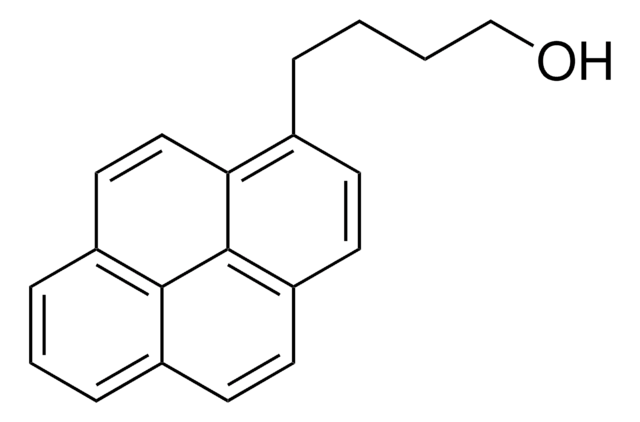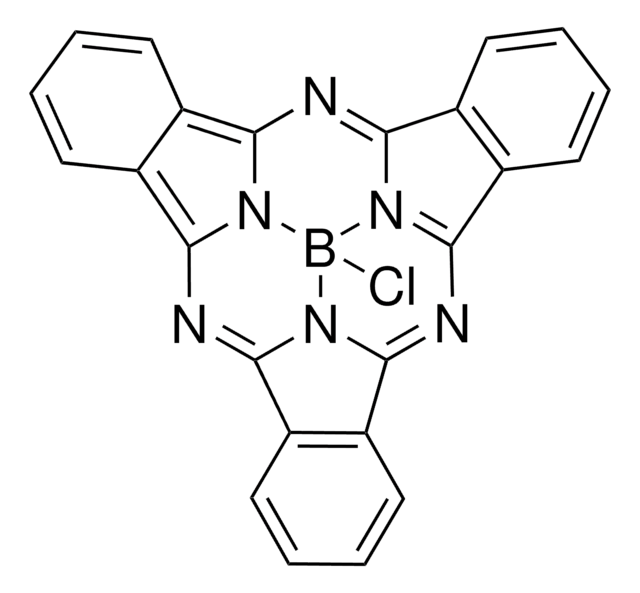All Photos(1)
About This Item
Linear Formula:
H3C(CH2)7C≡C2≡C(CH2)3CO2H
CAS Number:
Molecular Weight:
248.36
MDL number:
UNSPSC Code:
12352100
PubChem Substance ID:
NACRES:
NA.22
Recommended Products
Assay
97%
form
solid
mp
44-48 °C (lit.)
SMILES string
CCCCCCCCC#CC#CCCCC(O)=O
InChI
1S/C16H24O2/c1-2-3-4-5-6-7-8-9-10-11-12-13-14-15-16(17)18/h2-8,13-15H2,1H3,(H,17,18)
InChI key
RPTNONNBJKKVEV-UHFFFAOYSA-N
General description
5,7-Hexadecadiynoic acid is a diacetylenic acid. It participates in the synthesis of polymerizable asymmetric diacetylenic monomer compounds (ADMs). The FT-Raman and FT-IR spectra of 5,7-hexadecadiynoic acid have been recorded and assigned.
Application
5,7-Hexadecadiynoic acid (HDDA) may be used in the preparation of poly(HDDA)/zinc oxide(ZnO) nanocomposites.
Storage Class Code
11 - Combustible Solids
WGK
WGK 3
Flash Point(F)
Not applicable
Flash Point(C)
Not applicable
Personal Protective Equipment
dust mask type N95 (US), Eyeshields, Gloves
Certificates of Analysis (COA)
Search for Certificates of Analysis (COA) by entering the products Lot/Batch Number. Lot and Batch Numbers can be found on a product’s label following the words ‘Lot’ or ‘Batch’.
Already Own This Product?
Find documentation for the products that you have recently purchased in the Document Library.
Customers Also Viewed
Colorimetric sensing of various organic acids by using polydiacetylene/zinc oxide nanocomposites: Effects of polydiacetylene and acid structures.
Chanakul A, et al.
Colloids and Surfaces. A, Physicochemical and Engineering Aspects, 489, 9-18 (2016)
Dual colorimetric response of polydiacetylene/Zinc oxide nanocomposites to low and high pH.
Chanakul A, et al.
Journal of Colloid and Interface Science, 418, 43-51 (2014)
Controlling the reversible thermochromism of polydiacetylene/zinc oxide nanocomposites by varying alkyl chain length.
Chanakul A, et al.
Journal of Colloid and Interface Science, 389(1), 106-114 (2013)
Towards a universal method for the stable and clean functionalization of inert perfluoropolymer nanoparticles: Exploiting photopolymerizable amphiphilic diacetylenes.
Morasso C, et al.
Advances in Functional Materials, 20(22), 3932-3940 (2010)
Hongli Zhang et al.
Soft matter, 16(22), 5203-5209 (2020-05-20)
Discotic π-conjugated supramolecular assemblies, especially with chiral supramolecular nanostructures, have been attracting growing research interest due to their significant optoelectronic properties and the possibilities of their applications in the new generation of organic semiconductors. However, the impact of supramolecular chirality
Our team of scientists has experience in all areas of research including Life Science, Material Science, Chemical Synthesis, Chromatography, Analytical and many others.
Contact Technical Service








![Benzo[ghi]perylene 98%](/deepweb/assets/sigmaaldrich/product/structures/154/740/c50ff1be-dfb4-4159-a98c-9cecf9206ad3/640/c50ff1be-dfb4-4159-a98c-9cecf9206ad3.png)
